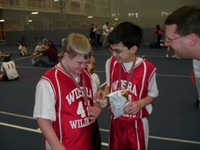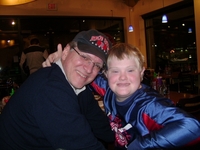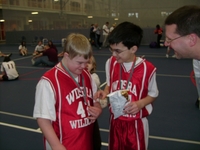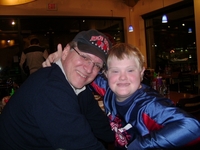Late last night, I was reading the news wires when the news of President Obama’s comments on The Tonight Show about bowling and Special Olympics caught my eye.

It’s too bad that the president’s bowling game isn’t better than he claimed, but it’s amazingly inappropriate for him to compare himself to Special Olympics bowling. Actually, Special Olympians are pretty good bowlers.
I know that for a fact.
My son, Mathias Dudley Morgan, soon to turn 11, will start his annual SO bowling program any day now. Mathias is a person with Down Syndrome. He bowls, swims laps, runs, ice stakes, square dances, plays softball, basketball, shoots pool. He has never met a ball he didn’t like. Ask his teachers and therapy team at Bower Elementary School in Warrenville, Illinois. Ask his two sisters, or his mom.
Mathias and the WDSRA Wildcats (his basketball team) recently completed their season – it was their best ever. Mathias scored his first points in competition three of the four last games of the season. (Photo: Mathias, far left, and team-mate receive their tournament medals from Coach Bob.)
This morning, Tim Shriver, head of the national Special Olympics program, spoke on Good Morning America and said that President Obama personally had called him from Air Force One to apologize for what the president had said.
Shriver was very good about accepting this apology, but did note the emotional pain that the president had caused. (Which is true.) Then, Shriver took it to a new level. He said the president had provided Americans with “a teachable moment.”
But my big question is this:

What do we Americans and American Christians need to learn from (not about) people with disabilities?
This question has haunted me in one form or another since the moment of Mathias’ birth, when I held my newborn son for the first time in labor and delivery, and I clearly heard the voice of an angel telling me, “Your son has Down Syndrome.” (That was unforgettable!)
Here are four things I have learned from nearly 11 years of teachable moments:
1. A person with a disability should be given the same dignity, respect, and opportunities as everyone else.
2. Exclusion is harmful, inclusion is always welcome, but inviting persons with a disability to be truly integrated into your life is a game-changing experience and a mysterious blessing beyond measure. (And a lot of hard work, too)
3. When we risk allowing the person with a disability to teach us, it makes our shared humanity more visible and helps us see our own limitations in a new light.
4. God, our Father, has deep purpose in allowing people with disability to live among us.
See you at the bowling alley, President Obama.










